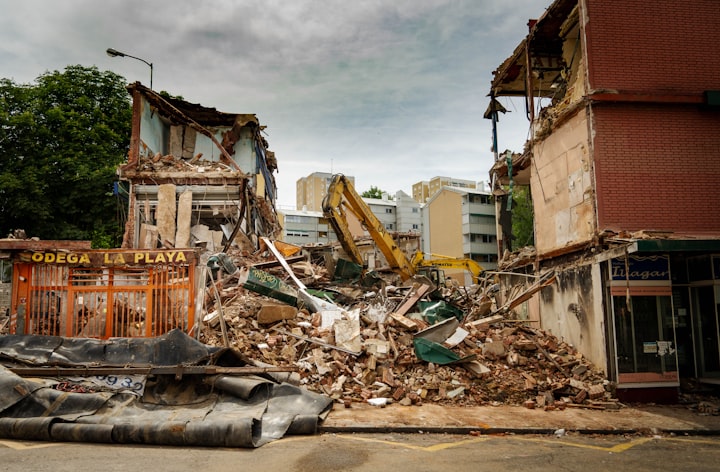"Understanding Earthquakes: Causes, Effects and How to Prepare"
2023

Earthquakes are one of the most destructive natural disasters that can occur. They are caused by the movement of tectonic plates beneath the Earth's surface, which can lead to severe ground shaking, landslides, and even tsunamis.
There are several different types of earthquakes, including tectonic earthquakes, volcanic earthquakes, and collapse earthquakes. Tectonic earthquakes occur when two tectonic plates grind against each other, while volcanic earthquakes happen when magma or lava moves beneath the Earth's surface. Collapse earthquakes occur when underground mines or caverns collapse.
The effects of earthquakes can be devastating. Ground shaking can cause buildings and infrastructure to collapse, leading to loss of life and injuries. Landslides and tsunamis can also occur as a result of ground shaking. In addition, earthquakes can cause fires and power outages, making it difficult for rescue and recovery efforts to take place.
To prepare for an earthquake, it's important to have an emergency plan in place. This should include having emergency supplies on hand, such as water, food, and a first aid kit. It's also important to know the emergency plan for your workplace or school, and to make sure that everyone in your household knows what to do in the event of an earthquake.
It's also important to secure heavy items in your home, such as bookcases and televisions, to prevent them from falling during an earthquake. Additionally, it's a good idea to retrofit your home or building to make it more earthquake-resistant. This can include adding straps to secure the roof to the walls, and adding a foundation that is less likely to crack during an earthquake.
It's also important to be aware of the warning signs of an earthquake, such as animals behaving oddly and unusual ground movement. By being prepared and aware, you can increase your chances of survival during an earthquake.
Overall, earthquakes can be devastating, but with proper preparation and awareness, you can increase your chances of survival. Make sure to have an emergency plan in place, secure heavy items in your home, and retrofit your home or building to make it more earthquake-resistant. Keep in mind that being aware of warning signs can make a big difference in an emergency.
It's also important to know the different types of seismic waves that are associated with earthquakes. There are two main types: P-waves and S-waves. P-waves, also known as primary waves, are compressional waves that move through the Earth's interior. They are the fastest seismic waves and are the first to arrive at a seismograph station. S-waves, also known as secondary waves, are transverse waves that move through the Earth's interior. They are slower than P-waves and arrive at a seismograph station after P-waves.
Earthquakes can also trigger secondary hazards such as landslides, rockfalls, and tsunamis. Landslides occur when soil or rock becomes unstable due to ground shaking, and can cause damage to buildings and infrastructure, as well as loss of life. Rockfalls happen when loose rock or debris falls from cliffs or steep slopes, often due to ground shaking. Tsunamis are large ocean waves that can be triggered by earthquakes, volcanic eruptions, and other underwater disturbances. They can cause significant damage and loss of life, especially in coastal areas.
Another important aspect of earthquake preparedness is having insurance to cover the cost of damage and repairs. Homeowners and businesses should consider purchasing earthquake insurance, as standard homeowners or business insurance typically does not cover damage caused by earthquakes. It is also important to review your insurance policy to ensure that you have the coverage you need in the event of an earthquake.
In addition, it's important to have a communication plan in place in case of an earthquake. This means having a way to contact family members, friends, and emergency services in the event of an emergency. It's also important to have a designated meeting place for family members, in case you are separated during an earthquake.
Earthquakes can also have long-term impacts on communities and economies. After an earthquake, it can take months or even years for communities to recover. Businesses may close, people may lose their jobs, and housing may be destroyed. The government and non-profit organizations play a crucial role in providing assistance and aid to affected communities during the recovery phase.
It's also important to note that earthquakes can happen anywhere in the world, not just in areas that are known for seismic activity. This means that even if you live in an area that is not known for earthquakes, it's still important to be prepared. By understanding the causes and effects of earthquakes, and taking steps to prepare, you can increase your chances of survival and minimize damage in the event of an earthquake.
About the Creator
Tanay Lonare
Hi there! I'm a passionate writer with a love for all things storytelling. My aim is to entertain and inform, , I hope to inspire and engage my readers. So sit back, relax, and join me on this journey through the written word!






Comments
There are no comments for this story
Be the first to respond and start the conversation.